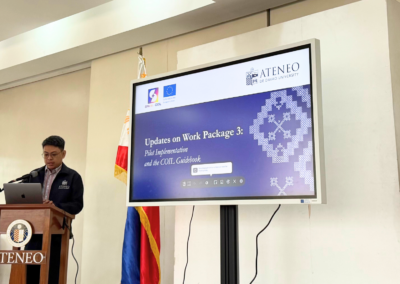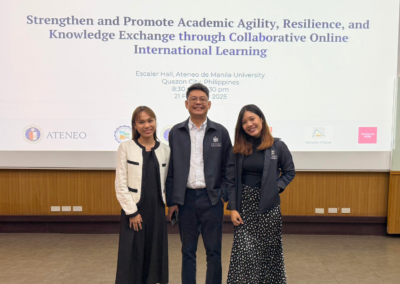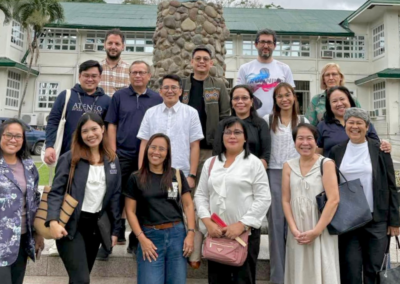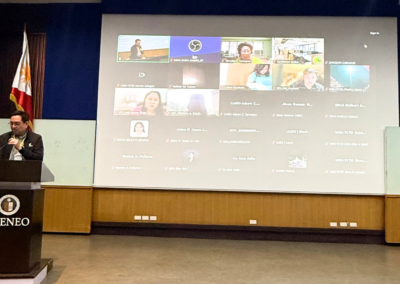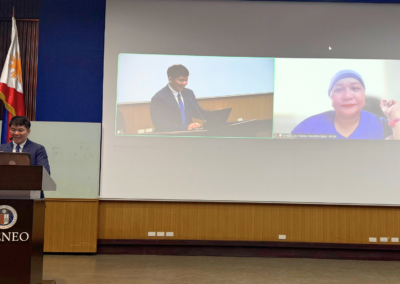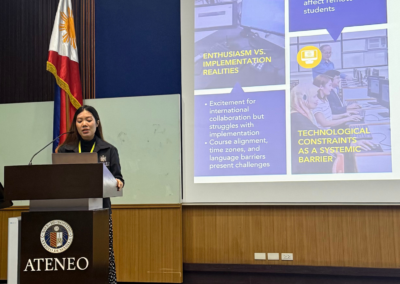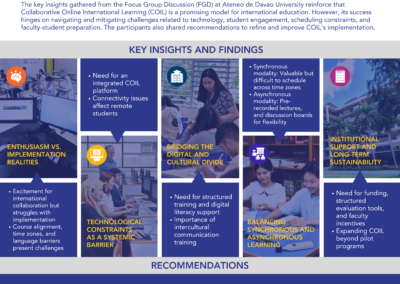Jesuit universities in the Philippines, in partnership with the European Union through its Erasmus+ program, officially launched the SPARK-COIL Project (Strengthen and Promote Academic Agility, Resilience, and Knowledge Exchange through Collaborative Online International Learning) through a kick-off conference held from 19 to 21 February 2025 at Ateneo de Manila University.
The SPARK-COIL is an Erasmus+ Capacity Building for Higher Education (CBHE) project designed to address gaps in COIL implementation across Philippine Higher Education Institutions. Aligned with European Union priorities, the project aims to internationalize curricula, promote inclusive global learning, adopt sustainable practices, and drive digital transformation through innovative pedagogical approaches and technology integration.
This Erasmus+ initiative facilitates collaboration among five Jesuit universities in the Philippines—Ateneo de Davao University, Ateneo de Manila University, Ateneo de Naga University, Ateneo de Zamboanga University, and Xavier University-Ateneo de Cagayan—along with European partner institutions, the University of Alicante, Spain and WSB University, Poland.
Representing Ateneo de Davao University (ADDU) at the conference were Mr. Romulo Vinci R. Bueza, Director of the Ateneo Internationalization for Mindanao (AIM) Office; Ms. Lyd Ejira C. Ducusin, AIM Assistant Director; and Ms. Hannah H. Mahinay, AIM Program Officer for Internationalization at Home.
The conference began with a management meeting, where project team members, partners, and grant beneficiaries aligned their plans, reviewed administrative details, and discussed progress on various work packages. Fr. Roberto C. Yap, SJ, President of Ateneo de Manila University (ADMU), welcomed the attendees and emphasized the SPARK-COIL project’s significance in advancing international collaboration.
On the second day, the delegation visited the Innovation Laboratory (iLab) at the University of the Philippines Los Baños, a CHED-supported initiative designed to facilitate virtual exchange programs and collaborative teaching among Philippine HEIs.
On the final day, the SPARK-COIL Kick-off Conference gathered educators, administrators, faculty, and students, both onsite and online, for discussions, workshops, and networking opportunities. Understanding the need for COIL in the curricula of respective HEIs and higher education in general is significant to the project’s success. To support this, each Ateneo university conducted Focus Group Discussions (FGDs) with administrators, faculty, and students in January; and key findings were presented during the conference. Ms. Mahinay from ADDU reported insights gathered and reinforced that COIL is a promising model for international education. However, its success depends on effectively navigating and mitigating challenges related to technology, student engagement, scheduling constraints, and faculty-student preparation, as expressed in the FGD.
Other resource speakers covered topics on virtual exchange and global education, including best practices, challenges, and COIL’s role in bridging HEIs. Atty. Lily Freida M. Milla, CESO III, CHED OIC Deputy Executive Director, delivered a keynote message on the state of virtual exchange in the Philippines. She outlined CHED’s ongoing COIL-related initiatives, including the iLab Project and various virtual engagements among Philippine universities.
Furthermore, Fr. Johnny C. Go, SJ, ADMU Dean of the Gokongwei Brothers School of Education and Learning Design, discussed SPARK-COIL’s innovative approach to COIL pedagogy and its potential to reshape teaching and learning in a globally connected world. Dr. Sabina Ratajczak, Akademia WSB Vice Rector for Development, also discussed COIL in the context of quality education.
Mr. Bueza from ADDU provided an in-depth discussion on COIL implementation and its role in internationalization. He raised key questions on how to foster intercultural dialogue among students despite geographical or financial barriers and how internationalization can be seamlessly integrated into curricula without disrupting institutional structures. He also shared learning experiences and mechanisms from ADDU’s pilot COIL implementation with the Association of Jesuit Colleges and Universities in Asia Pacific (AJCU-AP) network.
The conference then facilitated hands-on training and interactive workshops led by international speakers, Dr. Pawel Urgacz, Akademia WSB Deputy Dean for Internationalization; and Mr. Javier Molina, University of Alicante Assistant Professor.
As the conference concluded, a resounding message emerged–the opportunity for education to grow, adapt, and break barriers through digital transformation and international collaboration. SPARK-COIL is more than just an academic initiative; it has the potential to connect the global education community.
Recognizing the importance of internationalization in higher education, ADDU will continue to champion initiatives, such as the SPARK-COIL project, which strengthens global academic networks and empowers students and faculty through virtual exchange programs that transcend geographical boundaries.
Published on

